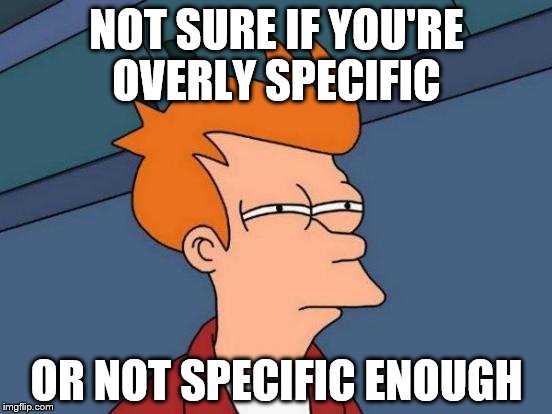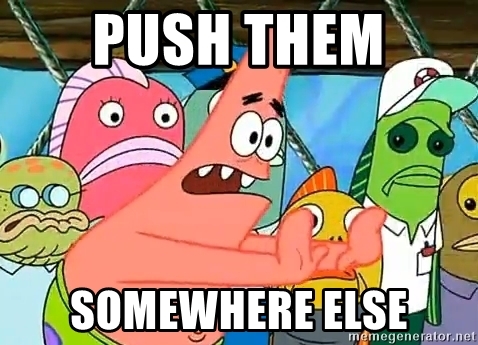Introducing flecks: an exceptionally-extensible application production system.
First off, 🙏
I appreciate you checking out the project! I truly hope that you will find working with flecks to be a joy. Feedback is welcome over on the Github discussions page or the Discord!
This is a new release and worked on by only one person: me! Please keep this in mind!
Is it webscale fullstack?

I admit, I baited with the title there just a little bit. I love fullstack! flecks is more than capable of building fullstack applications. If you just want to jump to more of that sort of thing, you might be interested in the React page in the documentation.
For real, though
A fullstack JS application is basically appception: what you actually have is a server application written in JS that serves a client application written in JS. Using the same language obscures (arguably, by design) the fact that these are actually two distinct applications.

'use controversy';Don't get it twisted
To put it in basic terms: A web server is a core aspect of a fullstack application, but a web server is not a core aspect of an application. The same could be said about asset optimization, routing, and many other core fullstack JS concepts.
flecks is concerned with writing applications; fullstack applications are merely a subset of that.
Do one thing and do it well
The core primitive is the fleck which is... just a JS module. There exists a server fleck, a web fleck, a React fleck, and so on.
Here's a simple fleck that says hello when the application is starting:
export const hooks = {
'@flecks/core.starting': () => {
console.log('hey you');
},
};
That's it. It's a module that exports some hook implementations. If you're curious what kind of hooks we're talking about, check out the hooks reference page.
You add a reference to your fleck to a file called
flecks.yml
and you're rolling. Use the
built-in tooling and you won't even have
to do that by hand. Again, a flecks application is just flecks having their hook
implementations invoked.
What are multiple flecks called? flecks!
It is not a coincidence that the name of the framework uses the same word as the plural form of its constituting elements: the implication is that flecks is just flecks, it's not really doing anything special on its own. Sure, it does something, but the something that it does is provide tools with which to orchestrate your flecks together into an application.
Small core
Creating an application with @flecks/create-app and then doing
e.g. npm ci --production will result in a full working application with a size of
less than 7 MB. Granted, it's only a server that will start, have nothing to do, and halt in
about 100 ms, but it illustrates that flecks builds what you tell it to, it is not a kitchen
sink system.

So where's asset optimization, data fetching, filetree routing, RSC...?
Well, I do admit that I don't stand before you today with a solution for every problem around fullstack development.
flecks is made with cooperation and collaboration as a primary concern. A fleck is just a package exactly for that reason: it should be frictionless to publish a package (or a suite) to the world and then add them to a project just like you would with any other package! It should be as frictionless for a developer to say "I don't agree with how this fleck is implemented" and write their own, interacting seamlessly with everything else they actually want.
I believe we can design modular solutions to these problems! In order to do this, it's probably better to be standing on top of less, not more.
Better no abstraction than the wrong abstraction
I know this will come off as inflammatory but some of the more recent JS framework "paradigms" feel like someone drunk-coded at midnight and had an epiphany about the "killer new thing" which means they are now going to spend the next 5 hours torturing their code only to wake up the next morning absolutely exhausted with a rickety codebase and a deep sense of regret as they revert all the changes and pretend that it never happened.

The flecks way
The few core architectural opinions that are held are presented as suggestions, not requirements.
― Robert Frost
A few motivating philosophies which I do not consider to be suggestions regarding this project:
- You shouldn't be unpleasantly surprised by what happens
- Your application has what you want in it, not what flecks wants in it
- Developer comfort and confidence are essential, not just a nice-to-have
- You shouldn't have to have a full budget for production deployment
- Core architectural opinions require transparency and justification
Why though?
You might be thinking something like:

Perhaps you will write a thesis explaining in great detail why there is no objective reason for flecks to exist. I'm fine with that, because I love it and there's nothing you can do about it.
Seriously though, a couple reasons why I made flecks and use it to develop applications are:
Separation of concerns
JS has matured a lot over the years, and modules are all but a first-class concept. This has been a huge win for Properly Structured™ applications.
However, I believe the real reason many fullstack frameworks exist today is to centralize concerns. No one wants to set up a whole database, a routing system, a webserver, etc, etc, etc. every time. So, the default approach has been to reach out for a framework to tie it all together. To some extent this is an inevitable evolution.

With flecks, the first principle is to push these concerns out into modular units which do one thing and do it immaculately. This is not a new concept! These units can be composed into an application that does as much or as little as you like, without requiring your application structure to follow some corporate diktat requiring you to enter a mailing address to submit a pull request. (don't ask...)
Joy

I have found this structure to work very well and to feel pleasant. It's great to get up and running super quickly without having to repeat a monolithic structure over and over. It's almost reminiscent of those small plastic building blocks my parents used to step on. Super fun!
I find that I don't have to think about what flecks is doing most of the time, which is exactly what I want.
flecks is at its best when you can forget that it exists and everything Just Works™.
I miss old React
One of the reasons I started using React over a decade ago was because it didn't try to dictate every aspect of how my application was built. This new-fangled server renderin' ain't new for me either. Not me casually dropping a link showing that I was messing with SSRing Angular 1 back in 2013.
Maybe it's irresponsible, maybe it's freewheeling (and yes, flecks (and everything) should have more tests) but I miss that old spirit and flecks is in some small way an homage to a Better Time™.
Because I can
No, seriously! Over the years interacting with various parts of the JS ecosystem I have experienced a few fairly hostile encounters with closed-minded people who lacked the imagination to see beyond the established wisdom of the week.
So I guess anyone who told me that it won't work, doesn't make sense, or other copium-based responses: Here it is! Eat your hearts out and haterz get meme'd on. 💅
Thanks again
I do appreciate you reading all that! I apologize if my tone came off as overly-antagonistic (as opposed to the-correct-amount-of-antagonistic). I actually think people are afraid to say some of the things I've said here out loud! Come send me love (or threats or whatever) at the Github discussions page or the Discord!
Most importantly: Have fun! ❤️
